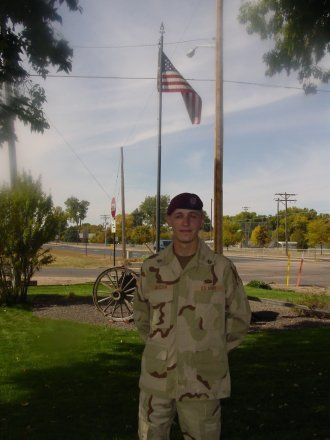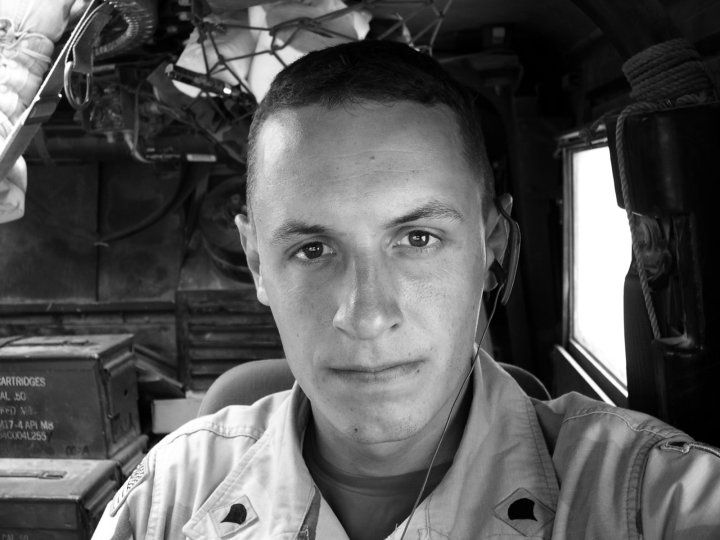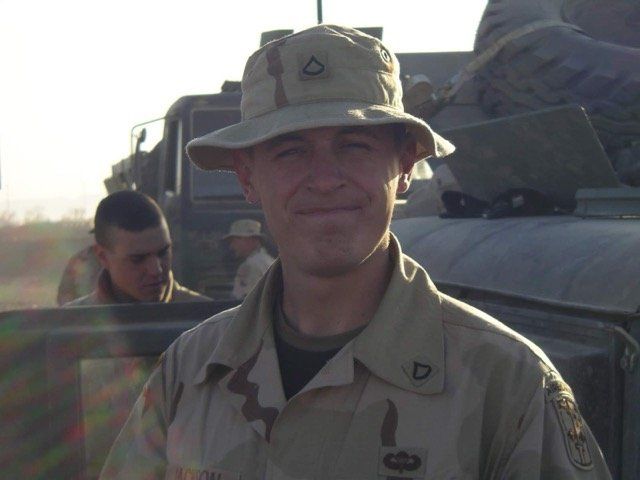The Meaning of Veterans Day

As the nation commemorates Veterans Day, I am grateful for the opportunity to share a bit about my personal experience. I dropped out of my first stint in college and enlisted in the U.S. Army in 2001, right after the 9/11 attacks. I recall walking into the recruiter’s office the following day. He told me to sleep on it and come back. I did, and I insisted on serving in the airborne infantry.
Part of my decision to enlist had to do with a sense of duty to a nation that had given me so much. I enjoyed a relatively safe childhood, a free public education, and so on. That engendered in me a sense that someone needed to do something to protect it all. In many ways, I was rather naive. But that’s not necessarily a bad thing.
I was ignorant about so very, very much. You see, I grew up in rural Colorado – practically Nebraska – in a town where you can’t even see the mountains. It was also 90 percent white, had an economy based on agriculture, and generally gave rise to a particular notion of patriotism that became popular along with a disturbing and dangerous amount of nationalist sentiment. But I barely understood these things back then.
Realizing America’s Diversity
My experience in the military opened my eyes in so many ways. I had the privilege to serve with people from all different backgrounds and parts of the American tapestry. I came to realize that America’s diversity really is its strength. The notion that someone can become an American, regardless of their background, and own a bit of what it means to define that term – American – well, that’s something special. And it was on full display in the U.S. Army.

My platoon sergeant was a former Florida State linebacker who grew up as a poor Black kid in rural Georgia. I looked on him as a second father, and still do. His personal stories about growing up, struggling as a young Black man in the South helped shift my perspectives and give me a better appreciation of my privileges growing up White. Issues of race were supposed to fall into the background in the military – we were all Green, after all – but they were still there, and still offered lessons, if you paid attention. That sergeant always told us not to sweat the “small matters” – the little things about which we had little control. That wasn’t to say we should disregard them entirely, just that we should keep a sense of perspective. That’s always stuck with me.
And then came the day that my unit received our orders to go to war. Many cheered at the opportunity. I was terrified. My platoon sergeant told us that it wasn’t a “small matter” anymore. He said to do our jobs well, work as a team, and he would do his best to bring us all home. He kept his promise. And we became a tight-knit platoon in the process. The soldiers I served with are still my brothers today.
Adapting to Life as a Veteran
Since getting discharged from the Army in 2006, I’ve been adapting to life as a veteran. It’s still an ongoing process after all these years. And that, to be honest, is weird. Adapting to life in the military is easy. Someone tells you what to do and when to do it. They may not tell you why, and they’ll probably only show you how to do it once and expect you to get it right thereafter. And they rarely tell you any of this nicely. But it’s guided. Easy.
There’s no such guidance for being a veteran. Sure, we have some common experiences, but if you’ve seen one veteran, you’ve just seen one veteran. We aren’t monolithic. We may not have any idea how to relate with each other’s experiences. I have no idea what it’s like to be a sailor or airman. I can barely relate to other soldiers in the Army who did different jobs. My experience is my own, and theirs is theirs. And that’s okay.
UCSF can work diligently to address health and health care disparities we see in veteran populations and in the communities that produce our veterans.
The lesson there is not to make assumptions about folks simply because they served. Don’t assume they served for the same reasons, either. Some did it out of a sense of patriotism. Some did it for access to benefits, others to get skills training. Too many enlisted to escape abusive households – the military remains one of the best ways to achieve this. And don’t assume that our service entailed sacrifice, either, or that we want to talk about said sacrifices. Personally, I’m happy to talk about my experiences. Others may prefer to keep it quiet. Both are fine. Just be aware that when you thank a veteran for their service, you may be inadvertently touching on painful scars and memories. If we volunteer our status as veterans, it’s probably okay. But if you simply happen to find out that someone is a veteran, tread lightly for their sake. All too often these days, Americans have a tendency to put veterans on a pedestal, and I don’t think that’s always helpful.
You see it every weekend, especially this month. NFL teams have camouflaged logos and extra American flags adorn the sidelines, airlines provide early seating to veterans, and you can be sure that many other businesses will leap at the opportunity to “honor our heroes.” Performative patriotism, and its inherent partisan assumptions, are inescapable, really. But not all of us feel like heroes. And these displays can be isolating, serving to put a gap between veterans and the society they served. Even if it is a positive motivation for that gap, it’s still a gap. And that can make things harder than they have to be.
Struggling with Mental Disorders
In fact, statistically speaking, about 20 veterans are committing suicide every day. More are dealing with substance abuse or struggling with chronic mental disorders. A lot of us are experiencing our bodies falling apart years before they should. It’s hard to feel like a hero when you are entertaining suicidal thoughts. Unfortunately, I speak from experience in this regard, and it didn’t help me to be served platitudes from strangers when I was struggling with my mental health.

You see, many of us develop a mentality that is prevalent in the military: drive on, push through, muscle up. That’s a useful mentality in the military, but there is no training for setting it aside once one becomes a veteran. You can’t muscle through a mental health crisis. You need the support of a community committed to helping you and affirming your value with actions, not with platitudes.
That’s part of the reason I was thrilled to have the opportunity to speak about Veterans’ Day at a recent town hall, because UCSF has the opportunity to provide that type of support. In fact, it has a strong tradition of doing just that.
When the nation went to war in 1917, the University of California’s Medical School answered the call and formed a medical unit out of the faculty that provided medical care in France. It continued that tradition in the Second World War, where UCSF provided the medical staff for the 30th General Hospital, which served in England from 1942 to 1945 and supported the American advance through Europe. And after the war, UCSF was one of the first institutions to formally affiliate with the Veterans’ Administration, ensuring that veterans in the Bay Area had access to the amazing medical minds and research at UCSF, and that UCSF’s students had access to a wealth of patients. That’s an incredible partnership and a tradition of which the university should rightly be proud.
Building Enduring Communities
There is still more that can be done, of course. UCSF and other medical schools have the opportunity to address shortages in critical areas like mental health. We need more practitioners in this field and our academic medical institutions need to do everything they can to make that happen. UCSF can work diligently to address health and health care disparities we see in veteran populations and in the communities that produce our veterans. We can shift our medical education to include historical and contextual factors that too often get lost in the data. And we can continue to produce cutting-edge research that will change lives. These are all honorable and worthy pursuits. They are ways of paying forward the privileges that have been afforded to us. They are ways of taking care of those who served and building enduring communities that can support us in times of need.
So, on this Veterans’ Day, let us recommit ourselves to honoring the service of our nation’s veterans by being a community worthy of their sacrifices.
Aaron Jackson is a PhD candidate in the History of Health Sciences, Department of Humanities and Social Sciences at UCSF. He is a veteran of the U.S. Army, serving as a Corporal in the 1/501st Airborne Infantry, 2002-2006.